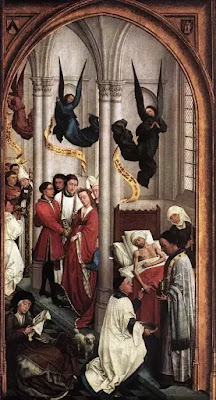"CONTINUITY is the principle and reality that comes up whenever one wants to understand what Catholicism is about on any particular point. On seeing this Catholics may take pride in the fact that it was the continuity of "the great church" that turned the word Catholic into the finest of epithets. . . . let the sacraments be taken first. Luther still wanted to retain two of them, baptism and the Eucharist, though in vain. For if the individual's act of faith was the means of salvation, there could remain no logical room for baptism as a means for salvation. Means mean nothing if they do not effect something. But there was nothing to effect, either by faith or by baptism, if justification was merely imputed. The right of baptism could only be a sign of something existing only in the mind of God as He was "imputing." No room then for a rite that confers the kind of continuity which is a new nature, the status of supernatural grace. Within Protestantism the custom of baptizing became indeed a blind bow to a custom, about which it is not possible to say that the Church was without it even in its very beginnings.
"As to the Eucharist, Luther could retain the sense of the real presence only for the 'moment' of communion. Ockham must have nodded. It was then logical not to conserve the sacred species, not to expose the Blessed Sacrament, not even to genuflect in adoration. Surely, the Church is logical in holding that the word "transubstantiation" is a most apt designation of what happens in the Sacrament of the Altar. If there is no real presence, which, let it not be forgotten, is continuity through space and time, there is no need for real priests, no need for men who "are priests forever according to the order of Melchizedech." As the prophet of ecclesial discontinuity, Luther was nowhere more logical than when he declared in his "The Babylonian Captivity of the Church," that some had to be ordained in the Church but only to prevent cacophony on Sundays in the churches." . . . [to be cont.]
~Stanley L. Jaki: The Gist of Catholicism
(Artwork: Seven Sacraments Altarpiece, by Rogier van der Weyden. Oil on oak panel, A.D. 1445-50. (Central panel, left wing & right wing). Koninklijk Museum voor Schone Kunsten, Antwerp)
"As to the Eucharist, Luther could retain the sense of the real presence only for the 'moment' of communion. Ockham must have nodded. It was then logical not to conserve the sacred species, not to expose the Blessed Sacrament, not even to genuflect in adoration. Surely, the Church is logical in holding that the word "transubstantiation" is a most apt designation of what happens in the Sacrament of the Altar. If there is no real presence, which, let it not be forgotten, is continuity through space and time, there is no need for real priests, no need for men who "are priests forever according to the order of Melchizedech." As the prophet of ecclesial discontinuity, Luther was nowhere more logical than when he declared in his "The Babylonian Captivity of the Church," that some had to be ordained in the Church but only to prevent cacophony on Sundays in the churches." . . . [to be cont.]
~Stanley L. Jaki: The Gist of Catholicism
(Artwork: Seven Sacraments Altarpiece, by Rogier van der Weyden. Oil on oak panel, A.D. 1445-50. (Central panel, left wing & right wing). Koninklijk Museum voor Schone Kunsten, Antwerp)



